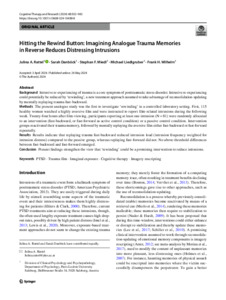|
Hitting the rewind button: Imagining analogue trauma memories in reverse reduces distressing intrusions
Rattel, Julina A.
;
Danböck, Sarah K.
;
Miedl, Stephan Franz
;
Liedlgruber, Michael
;
Wilhelm, Frank H.
![[img]](https://madoc.bib.uni-mannheim.de/69205/1.hassmallThumbnailVersion/s10608-024-10488-8.pdf)  Vorschau |
|
PDF
s10608-024-10488-8.pdf
- Veröffentlichte Version
Download (1MB)
|
|
DOI:
|
https://doi.org/10.1007/s10608-024-10488-8
|
|
URL:
|
https://link.springer.com/article/10.1007/s10608-0...
|
|
URN:
|
urn:nbn:de:bsz:180-madoc-692056
|
|
Dokumenttyp:
|
Zeitschriftenartikel
|
|
Erscheinungsjahr:
|
2024
|
|
Titel einer Zeitschrift oder einer Reihe:
|
Cognitive Therapy and Research
|
|
Band/Volume:
|
48
|
|
Heft/Issue:
|
5
|
|
Seitenbereich:
|
932-943
|
|
Ort der Veröffentlichung:
|
New York, NY ; Dordrecht
|
|
Verlag:
|
Springer
|
|
ISSN:
|
0147-5916 , 1573-2819
|
|
Sprache der Veröffentlichung:
|
Englisch
|
|
Einrichtung:
|
Fakultät für Sozialwissenschaften > Klinische u. Biologische Psychologie u. Psychotherapie (Alpers 2010-)
|
|
Bereits vorhandene Lizenz:
|
 Creative Commons Namensnennung 4.0 International (CC BY 4.0) Creative Commons Namensnennung 4.0 International (CC BY 4.0)
|
|
Fachgebiet:
|
150 Psychologie
|
|
Abstract:
|
Background
Intrusive re-experiencing of trauma is a core symptom of posttraumatic stress disorder. Intrusive re-experiencing could potentially be reduced by ‘rewinding’, a new treatment approach assumed to take advantage of reconsolidation-updating by mentally replaying trauma fast-backward.
Methods
The present analogue study was the first to investigate ‘rewinding’ in a controlled laboratory setting. First, 115 healthy women watched a highly aversive film and were instructed to report film-related intrusions during the following week. Twenty-four hours after film-viewing, participants reporting at least one intrusion (N = 81) were randomly allocated to an intervention (fast-backward, or fast-forward as active control condition) or a passive control condition. Intervention groups reactivated their trauma memory, followed by mentally replaying the aversive film either fast-backward or fast-forward repeatedly.
Results
Results indicate that replaying trauma fast-backward reduced intrusion load (intrusion frequency weighted for intrusion distress) compared to the passive group, whereas replaying fast-forward did not. No above-threshold differences between fast-backward and fast-forward emerged.
Conclusion
Present findings strengthen the view that ‘rewinding’ could be a promising intervention to reduce intrusions.
|
 | Das Dokument wird vom Publikationsserver der Universitätsbibliothek Mannheim bereitgestellt. |
 | Dieser Datensatz wurde nicht während einer Tätigkeit an der Universität Mannheim veröffentlicht, dies ist eine Externe Publikation. |
 Suche Autoren in Suche Autoren in
BASE:
Rattel, Julina A.
;
Danböck, Sarah K.
;
Miedl, Stephan Franz
;
Liedlgruber, Michael
;
Wilhelm, Frank H.
Google Scholar:
Rattel, Julina A.
;
Danböck, Sarah K.
;
Miedl, Stephan Franz
;
Liedlgruber, Michael
;
Wilhelm, Frank H.
ORCID:
Rattel, Julina A. ; Danböck, Sarah K.  ORCID: 0000-0001-9989-1146 ORCID: 0000-0001-9989-1146 ; Miedl, Stephan Franz ; Liedlgruber, Michael ; Wilhelm, Frank H.
Sie haben einen Fehler gefunden? Teilen Sie uns Ihren Korrekturwunsch bitte hier mit: E-Mail
Actions (login required)
 |
Eintrag anzeigen |
|
|
 ORCID: 0000-0001-9989-1146 ; Miedl, Stephan Franz ; Liedlgruber, Michael ; Wilhelm, Frank H.
ORCID: 0000-0001-9989-1146 ; Miedl, Stephan Franz ; Liedlgruber, Michael ; Wilhelm, Frank H.



 Creative Commons Namensnennung 4.0 International (CC BY 4.0)
Creative Commons Namensnennung 4.0 International (CC BY 4.0) Suche Autoren in
Suche Autoren in